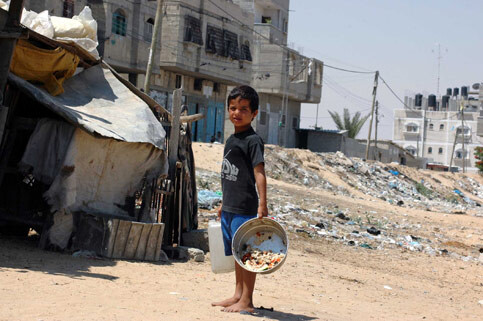
Such people can never be true foes: After the clashes life returns to “normal” for Palestinians in Gaza — whether Fatah, Hamas or another political faction — who are still struggling against Israeli occupation. (Hatem Omar/MaanImages)
“You see, both Ahmad and I are staying in the same room at this hospital, where we are being treated for wounds we have sustained during infighting. I am a Hamas supporter, while he is with Fatah,” said Ibrahim, who was shot with several bullets in his body.
Ahmad, the Fatah supporter and preventive security personnel of the al-Tuffah neighborhood in central Gaza City, said it all with his sad eyes.
“What fault has my son committed to be in such a situation? May God take revenge on those who have beaten him,” said a bearded man, Ahmad’s father.
Both Ibrahim of the Maghazi Refugee Camp in central Gaza Strip and Ahmad of the al-Tuffah neighborhood, happen to be patients in the same Egyptian hospital and even in the same room.
In Gaza, they might have never met or even talked to each other, but in Cairo they appear to be good roommates, treating each other as if they were friends and not foes, unlike their peers in Gaza.
This raises a question: what is this hatred and disagreement simmering between Fatah and Hamas, while victims of the infighting seem to be brothers, sharing the same suffering and even the same fate?
These are truly brothers, no more than this; once they were side by side in their dignified struggle against their common enemy. Such people can never be true foes at any rate.
Ibrahim of Hamas happened to be walking close to the Palestinian president’s Gaza house when a group of Fatah supporters stopped him and began shooting at him, causing severe bleeding.
Because of his critical health condition, the ill-equipped Gaza hospitals transferred him to a Cairo hospital, as they have with many helpless Palestinians who have been treated in the Egyptian city for the past several years.
Ibrahim’s beard, signifying Islamist sympathies, is the reason for his critical condition. He is paying a heavy price for this beard — a price that could only be paid in Gaza.
The other Fatah victim, Ahmad, was exposed to severe beating by Hamas-linked men, for another major fault: belonging to a security body called “preventive security,” an apparatus that has been accused by Hamas of involvement in destabilizing Gaza.
Thanks go to Egypt for treating these two Palestinians and many more, for uniting Hamas and Fatah members, a unity that politicians are still unable to secure.
Meanwhile, damn this infighting that leaves the Palestinian youth — Palestine’s treasure — handicapped and traumatized. Shame upon Palestinian hands that undermine Palestinian health, education and other public services and damn those who fight over beards or affiliation.
Instead of fighting and inflicting numerous disabilities on Palestinians, Palestinian hands should rather focus on developing our health system that has forced myself and many more Palestinians to cross borders for CT scans or surgeries.
Almost three weeks ago, Fatah and Hamas supporters resumed infighting in Gaza, causing many deaths and leaving Gaza under the exclusive control of Hamas forces, while the West Bank is now under Fatah’s control.
Furthermore, Gaza has been under siege by the international community, which rejected the Hamas government after the January 2006 legislative council elections, so God only knows what the future holds for the Palestinian people.
Rami Almeghari is currently contributor to several media outlets including the Palestine Chronicle, aljazeerah.info, IMEMC, The Electronic Intifada and Free Speech Radio News. Rami is also a former senior English translator at and editor in chief of the international press center of the Gaza-based Palestinian Information Service. He can be contacted at rami_almeghari at hotmail.com.
Related Links





